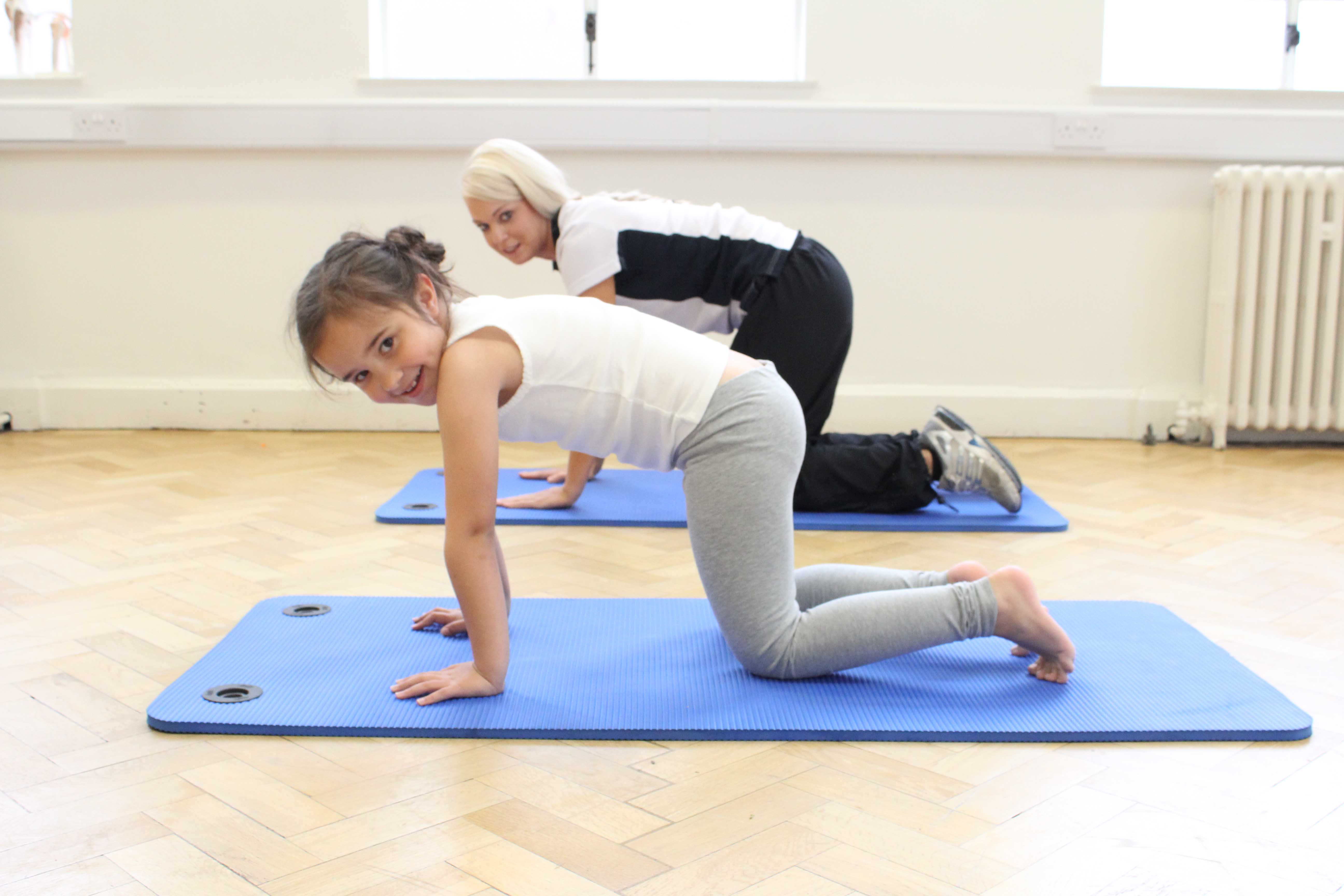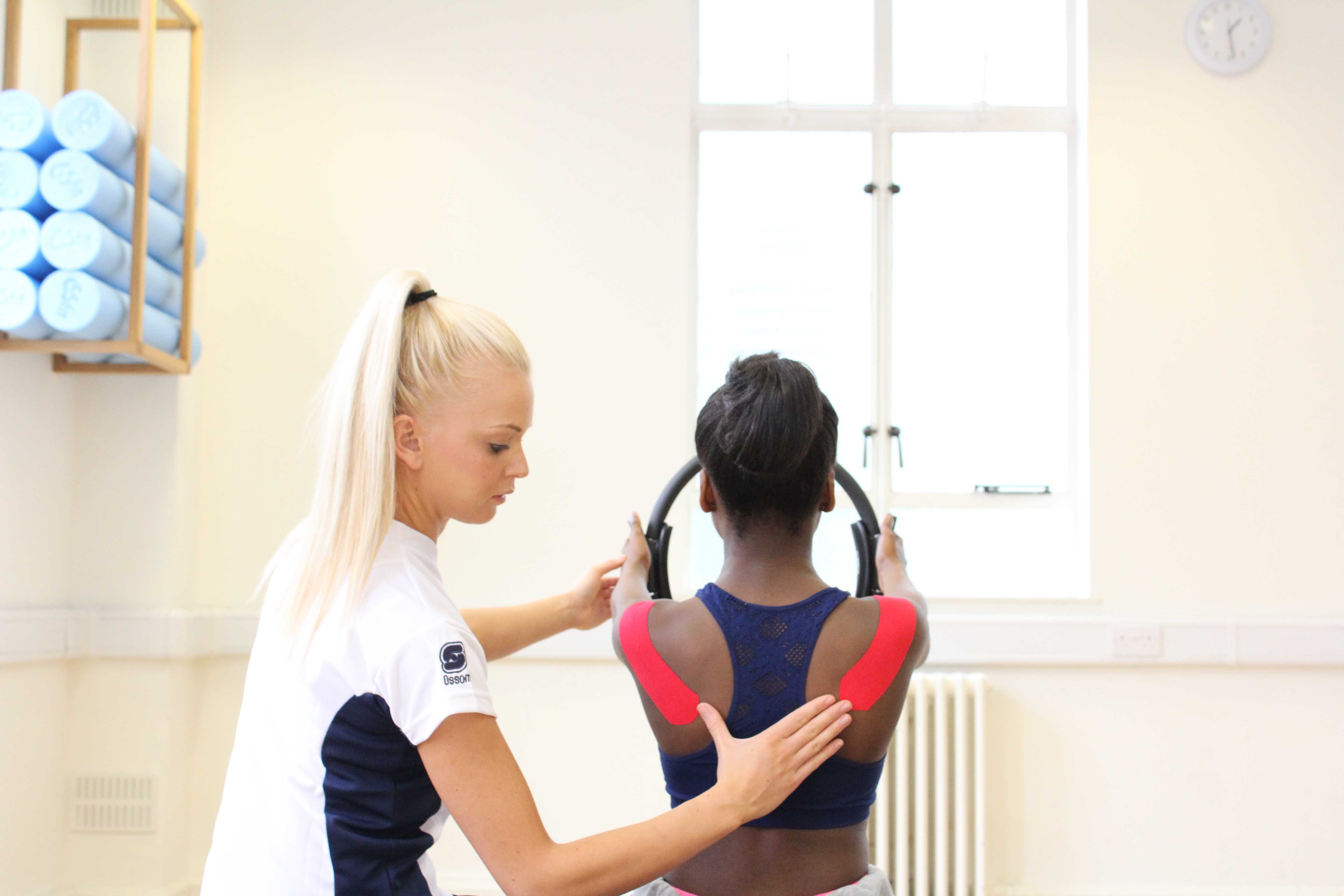What are growing pains?
Growing Pains are the pains that cause children to wake up from their sleep complaining of pain, aching or burning sensations in their legs, and occasionally their arms. Most commonly the pain is felt in the child’s thighs, calf muscles, shins or their knees. Growing pains are very common in children, especially children of primary school age.
Growing pains affect around 20 percent of all children; typically growing pains occur when they are going through a period of fast growth. Typically the pain is felt in the evenings or after a day of particularly strenuous activity.
 Above: Stertches and toning exercises supervised by specilaist paediatric physiotherapist
Above: Stertches and toning exercises supervised by specilaist paediatric physiotherapistPain in your child’s joints can also be a sign of other conditions. Sometimes children diagnosed with growing pains may have; hypermobility, muscle tightness, poor posture, or arthritis. The physiotherapist at Physio.co.uk will be able to perform a comprehensive assessment of your child. They will then be able to determine if there is a biomechanical problem contributing to the pain, and treat it accordingly.
To arrange a physiotherapy appointment with Physio.co.uk call 0330 088 7800, or book online
 Above: Physiotherapist using taping to help stabilise the muscles in the upper back during exercise
Above: Physiotherapist using taping to help stabilise the muscles in the upper back during exerciseWhat causes growing pains?
Growing pains are the results of your child’s bones growing faster than their muscles, therefore, growing pains most commonly affect the long bones such as the femur (thigh bone) and tibia (shin bone). During a growth spurt bones can grow by as much as 1mm per day, whereas muscles, tendons and ligaments can only grow by 0.8mm a day. This means it takes time for the muscles to catch up and during this period your child may experience pain.
Growing pains often cause night pains, this is particularly common in the calf, shin and behind the knees. This is due to muscles struggling to keep up with the fast rate of bone growth. Therefore, muscle imbalance occurs and this will lead to night pain in and around the most affected joints. Pain can also lead to a reduction in function and aching or burning after rigorous activity.
What are the symptoms of growing pains?
Growing pains Symptoms:
- Muscles pain that causes your child to wake up in the night
- Growing pains usually occur in later in the day or at night
- Variable frequency – some children get pain every night, some only once a week and other only experience pain rarely.
- Pain Intensity is usually mild, some children however, do experience severe pain
- The pain associated with growing pains can be last a few minutes, to a few hours
- Growing pains affect the muscles; pain in the joints would indicate the problem is not caused by growing pains.
- Common areas for growing pains are the front of the thighs, in the calves, or behind the knee.
- Growing pains most commonly affect both limbs at the same time
- Growing pains do not cause the joints to look any different
- The majority of children are pain free in the morning
- Growth pain may also be a cause of restlessness
What should I do if my child has growing pains?
In 90 percent of children the growing pains will clear up quickly.
Physio.co.uk recommends that you make an appointment for your child to see the doctor if they have; fever, morning pain, fatigue, reduced appetite, swelling or redness.
If the above symptoms are not present you may try:
- Gentle massage of the sore muscles
- Reassure your child
- Heat - A warm bath or a hot water bottle over the affected muscles can help.
- Talk to your child about their pain so they do not become anxious as this can make the pain seem worse.
If the growing pains persist it can lead to muscle imbalance. This can put increased stresses and strains on a joint. This can cause chronic inflammation and recurrent injury and will require physiotherapy treatment.
What things should my child avoid if they have growing pains?
Until your child has been assessed by a physiotherapist we recommend they should avoid activities that exacerbate their growing pains. For example, high levels of physical activity, active sports, and PE lessons
Physiotherapy for growing pains
Physio.co.uk will assess your child’s symptoms and then provide your child with a diagnosis and recommend the most appropriate treatment.
In the assessment your child's physiotherapist will look at; ranges of movement, muscle length, muscle strength and posture. The assessment will focus on determining the underlying biomechanical cause of your child’s pain. This will allow them to treat the specific muscle or joint that is causing the problem. The physiotherapist can then provide your child with a tailored exercise programme that they can follow to reduce their pain. Physiotherapy treatment may also involve; showing you and your child stretches for reducing growing pain, providing massage, heat treatment and advice & education.
To arrange a physiotherapy appointment book online or call Physio.co.uk on 0330 088 7800

 0330 088 7800
0330 088 7800


































